When you buy through our links, we may earn a commission. Products or services may be offered by an affiliated entity. Learn more.
You should make a few considerations when choosing a mattress for your bunk bed. Most of these beds can accommodate twin, twin XL, and/or full size mattresses, but larger sizes will be too wide and long to fit within the bunks. Low-profile mattresses are often ideal, as well. Mattresses that are too thick are often too heavy for bunk beds, and these models can also pose safety concerns on upper bunks. Want to learn about our top mattress picks across all age groups? Visit our guide to 2025’s best mattresses for more details.
- Our top pick — the Helix Kids — is built for children from ages 3 to 12, making it ideal for bunk beds. Parents in our Test Lab appreciated its supportive, reversible design.
- Our best bunk bed mattress guide also looks at how these beds are designed and constructed, along with which types of mattresses work best with them.
- Need a quick recommendation? Go straight to our top picks.
Our Top Picks
-
Best Overall – Helix Kids
View Details
-
Best Value – Dreamfoam Hybrid
View Details
-
Best Luxury – Saatva Youth
View Details
-
Most Comfortable – Bear Cub
View Details
-
Best for Younger Kids – Nest Bedding Puffin
View Details
-
Best Low Profile – Dreamfoam Essential
View Details
-
Best Organic – Avocado Eco Organic Kids Mattress
View Details
-
Best Pressure Relief – Brentwood Home Juniper
View Details
Swipe for more
Best Overall
Helix Kids
8.5 /10
Test Lab Score
27% off sitewide + 2 free Dream Pillows with a mattress purchase. Code: SF27
27% off sitewide + 2 free Dream Pillows with a mattress purchase. Code: SF27
The Helix Kids caters to kids from age 3 through age 12, with a different firmness on either side to offer fine-tuned support as your child grows. This flippable mattress has an 8-inch profile made to fit standard bunk beds. A handy water-repellent coating helps ward off permanent stains.
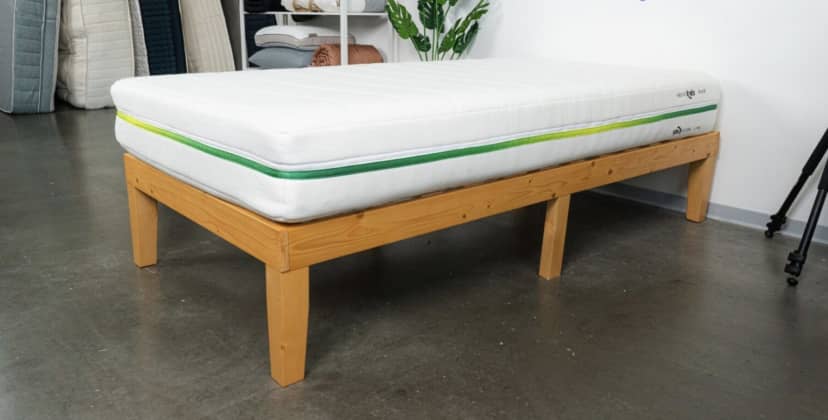
Credit: Sleep Foundation Test Lab
Price
$749
Mattress Type
Hybrid
Firmness Options
Medium Soft (4), Medium Firm (6)
Trial Period
100 nights (30-night requirement)
Full Details
Who It’s Best For
Helix has designed the firm side of the mattress for kids aged 3 to 7 years old, while the softer side is intended for kids aged 8 to 12. Ultimately, which side your child prefers is up to their own personal preference and may also vary depending on their usual sleeping position.
Feel
The Helix Kids has a medium soft (4) side that hugs the body to relieve pressure points. The other side is medium firm (6), with a more responsive, bouncier feel.
What It’s Made Of
Each side of the Helix Kids is a little different. The medium firm side features a responsive polyfoam layer that delivers the firm support preferred by younger children. The medium soft side is made with gel memory foam that adds a touch of plushness for older children. Both sides share a pocketed coil core with reinforced edges, and a Tencel cover with water-repellent coating to protect against accidents.
What We Don’t Like
The Helix Kids is not available in a twin XL size.
Scoring & Reviews
The following ratings show how suitable this mattress is for different sleeping positions and sleeper weights. These scores are determined by how well the mattress supports and relieves pressure for each sleeper type.
We performed a meta-analysis on 514 validated customer reviews of the Helix Kids. This is what people who bought the mattress had to say:- Versatility: The mattress is flippable with different firmness levels, making it suitable for children as they grow. This feature is highly valued by parents looking to make a long-term investment in a mattress.
- Material Quality: Users generally report that the mattress is made from high-quality materials, contributing to its durability and comfort.
- Smell and Off-gassing: Some users report a noticeable smell upon unpackaging, which can take a few days to dissipate. This is a common issue with new mattresses but can be a concern for sensitive individuals.
- Size Issues: There are occasional complaints about the mattress not fitting perfectly in standard frames, sometimes being slightly shorter or narrower than expected.
- Customer Service: Helix generally receives positive reviews for customer service, with prompt and helpful responses. However, there are isolated reports of delivery issues or difficulty arranging returns.
Best Value
Dreamfoam Hybrid
7.5 /10
Test Lab Score
25% off sitewide. Code: PRESDAY25
25% off sitewide. Code: PRESDAY25
The Dreamfoam Hybrid has an impressively complex design for a mattress at this price-point, offering specialty cooling materials and individually wrapped coils with reinforced edges. It’s available in twin and twin XL sizes as well as RV bunk.
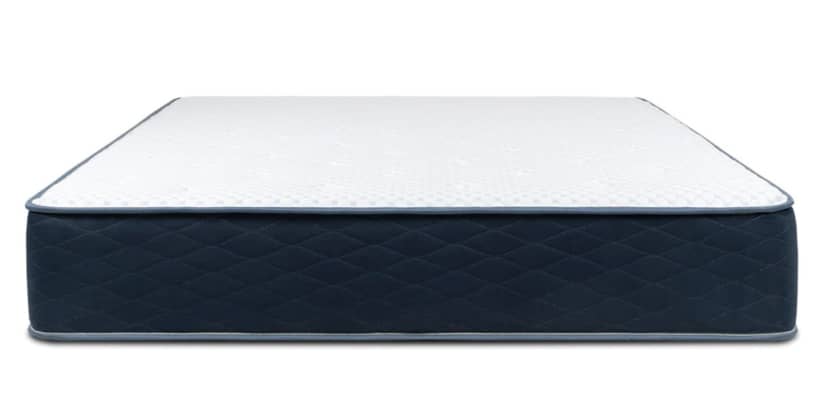
Price
$749
Mattress Type
Hybrid
Firmness Options
Medium Firm (6)
Trial Period
120 nights (30-night requirement)
Full Details
Who It’s Best For
During our tests the Dreamfoam performed best for side and back sleepers, especially those weighing 130 to 230 pounds. The mattress is suitable for both children and adults.
Feel
The Dreamfoam has a medium firm (6) feel. The top layers are quite squishy, offering contouring for side and back sleepers, while the pocketed coils hold up the spine.
What It’s Made Of
The cover of the Dreamfoam Hybrid is quilted and has an integrated cooling panel made with phase change material. This is followed by 2.5 inches of gel memory foam, and finally a 6-inch pocketed coil support core with reinforced sides and a thin layer of base foam.
What We Don’t Like
At 10.25 inches thick, the Dreamfoam may be too high for some bunks. The soft surface may inhibit movement and allow too much sink for stomach sleepers, although kids should be ok. DreamCloud charges a $99 return fee.
Scoring & Reviews
The following ratings show how suitable this mattress is for different sleeping positions and sleeper weights. These scores are determined by how well the mattress supports and relieves pressure for each sleeper type.
We performed a meta-analysis on 2908 validated customer reviews of the Dreamfoam Hybrid. This is what people who bought the mattress had to say:- Comfort and Support: Many users have praised the mattress for its exceptional comfort and support, noting that it provides a good balance between softness and firmness, which is beneficial for both side and back sleepers.
- Eco-Friendly Materials: The mattress is frequently highlighted for its use of organic and sustainable materials, including organic latex, cotton, and wool, making it a popular choice for environmentally conscious consumers.
- Durability: Several reviews mention the mattress’s durability, indicating that it maintains its shape and comfort over time without sagging or forming indentations.
- Temperature Regulation: The mattress is often noted for its ability to regulate temperature effectively, providing a cool sleeping environment which is appreciated by sleepers who tend to sleep hot.
- Motion Isolation: Couples have reported satisfaction with the mattress’s ability to isolate motion, allowing one partner to move without disturbing the other, contributing to a restful night’s sleep.
- Odor-Free: Users appreciate that the mattress does not emit any off-gassing smells, which is a common issue with many new mattresses, making it suitable for those with sensitivities or preferences for odor-free products.
Best Luxury
Saatva Youth
8.3 /10
Test Lab Score
Up to $600 off
Up to $600 off
The Saatva Youth is split into two parts, with one side offering a firmer feel for kids aged 3 to 7 and the other side adding more cushioning for kids aged 8 through 12. Standing at 10 inches and sold in twin, twin XL, and full sizes, the mattress is made from primarily natural materials with low off-gassing potential and a long expected lifespan.
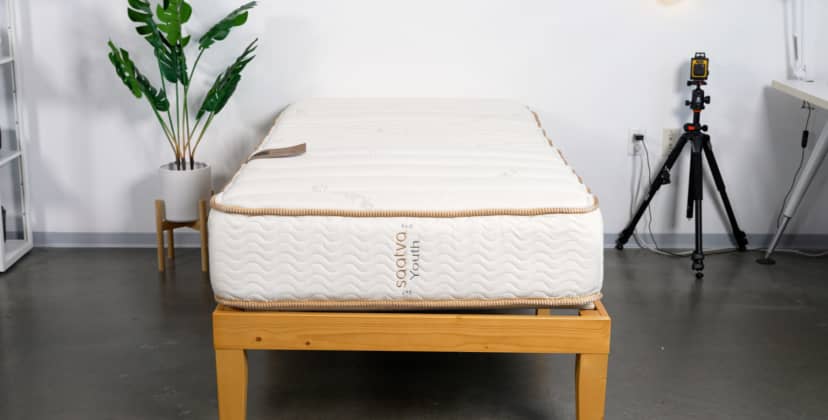
Credit: Sleep Foundation Test Lab
Price
$795
Mattress Type
Innerspring
Firmness Options
Medium (5), Firm (7)
Trial Period
365 Nights ($99 Return Fee)
Full Details
Who It’s Best For
The design of this mattress is optimized for children and pre-teens. With two firmness options incorporated into the same mattress, kids should be able to find a side that works regardless of their preferred sleeping position.
Feel
The “younger” side of the Saatva Youth rates a 7 out of 10 on our firmness scale, or firm. This side provides sturdier spinal support to support development. The other side has more cushioning, with a medium (5) feel that may appeal more to older children.
What It’s Made Of
The Saatva Kids has a water-resistant organic cotton cover with a natural thistle flame barrier. The younger side contains a polyfoam comfort layer with five zones, including a firmer section in the middle third. The softer side has a layer of convoluted polyfoam to promote airflow, backed by lumbar spinal wire designed to encourage healthy posture for growing bodies. An innerspring core ensures responsive spinal support for both sides.
What We Don’t Like
Saatva offers free White Glove delivery with every mattress sold, but the company charges $99 if you decide to return the mattress. At 10 inches thick, this mattress may not leave enough headroom on the lower bunk
Scoring & Reviews
The following ratings show how suitable this mattress is for different sleeping positions and sleeper weights. These scores are determined by how well the mattress supports and relieves pressure for each sleeper type.
We performed a meta-analysis on 26 validated customer reviews of the Saatva Youth. This is what people who bought the mattress had to say:- Improved Sleep for Children: Parents consistently report that their children sleep better on the Saatva Youth mattress, highlighting improved comfort compared to previous mattresses.
- Comfort and Durability: Customers frequently mention the mattress’s comfort and durability, noting that it holds up well even under adult weight during activities like reading bedtime stories.
- Dual Firmness Feature: The mattress offers different firmness levels on each side, which accommodates growing children’s needs as they age, providing long-term usability.
- Positive Delivery Experiences: Many reviewers highlight the efficiency and friendliness of the delivery service, with quick and smooth delivery being a common theme.
- Customer Service: Saatva’s customer service is frequently praised for being responsive and helpful, particularly in resolving issues like incorrect or problematic deliveries.
- Versatility and Support: Parents appreciate that the mattress supports different weights and sizes comfortably, making it a good choice for both children and occasional adult use.
Most Comfortable
Bear Cub
7.8 /10
Test Lab Score
35% off + free pillows with code: SF35
35% off + free pillows with code: SF35
The Bear Cub Mattress is a child-friendly hybrid with an 8.5-inch profile, ideal for bunk beds. With its gel memory foam surface, the bed offers gentle cushioning for a plush sense of comfort. A coil support layer boosts airflow and strengthens the edges of the bed so kids won’t sink toward the guardrails.
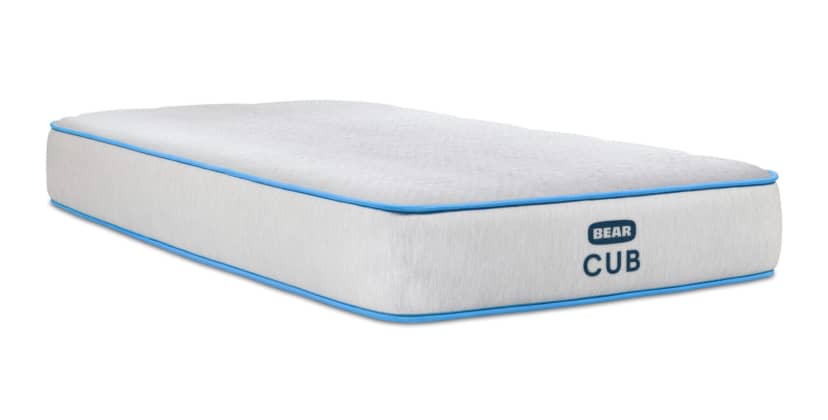
Price
$452
Mattress Type
Hybrid
Firmness Options
Firm (7)
Trial Period
120 nights (30-night break-in period)
Full Details
Who It’s Best For
Teenagers as well as kids aged 3 and up benefit from the Bear Cub’s supportive design. The coils provide pushback to maintain spinal alignment in any sleep position, whether side, back, or stomach.
Feel
While the Bear Cub does contain layers of memory foam and polyfoam, these are relatively thin. Sleepers stay mostly on top of the bed and enjoy plenty of bounce from the coils. Overall, the Bear Cub delivers a firm (7) feel.
What It’s Made Of
The Bear Cub has a quilted Tencel cover followed by a layer of gel memory foam, designed to cushion pressure points and whisk heat away from the body. The transition to the support core is eased by a layer of responsive polyfoam. A 6-inch pocketed coil base flexes to support healthy spinal alignment.
What We Don’t Like
With its firmer surface and thin comfort system, the Bear Cub doesn’t provide as much pressure relief as some other models. If your child prefers the feeling of being “hugged” by their mattress, they’d be better off with a memory foam model.
Scoring & Reviews
The following ratings show how suitable this mattress is for different sleeping positions and sleeper weights. These scores are determined by how well the mattress supports and relieves pressure for each sleeper type.
We performed a meta-analysis on 79 validated customer reviews of the Bear Cub. This is what people who bought the mattress had to say:- Ideal for Children: The mattress is frequently praised for improving children’s sleep, with reports of kids loving their new beds and sleeping through the night.
- No Off-Gassing: Several users appreciate that the mattress does not emit any unpleasant chemical smells upon unboxing, which is a significant advantage for those concerned about air quality and health.
- Dual Use: Parents often mention that the mattress is comfortable enough for them to sleep on when needed, highlighting its dual usability for both children and adults.
- Customer Service Issues: There are a few mentions of poor customer service, particularly regarding communication and responsiveness to customer inquiries.
- Edge Support: Some negative feedback about the mattress includes weak edge support, which can be an issue when sitting on the side of the bed.
- Environmental Concerns: The mattress is favored by environmentally conscious buyers for being a “greener” option compared to other brands on the market
Best for Younger Kids
Nest Bedding Puffin
7.7 /10
Test Lab Score
We love the Nest Bedding Puffin for its 7-inch profile. This all-foam model easily fits into any bunk bed with a generous amount of room for the guardrail and plenty of space to sit up.
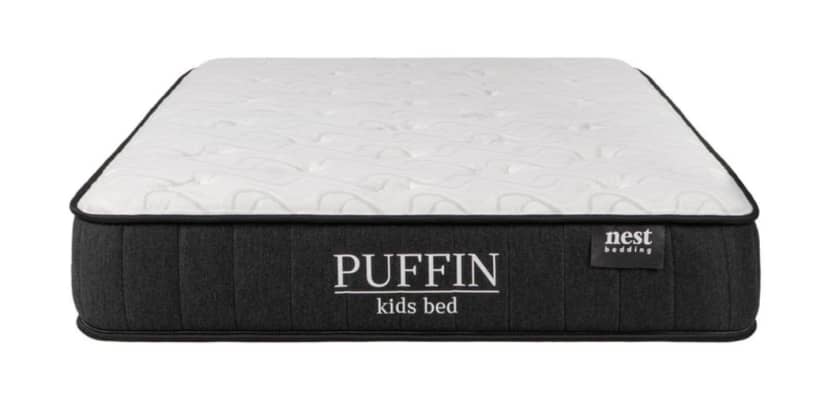
Price
$599
Mattress Type
Foam
Firmness Options
Firm (7)
Trial Period
30 nights
Full Details
Who It’s Best For
The Nest Bedding Puffin is popular with toddlers and young school-age children. It’s also a good choice for hot sleepers who prefer a foam mattress.
Feel
This bed isn’t exactly bouncy, but the firm (7) surface and quick-response foam in the top layer of the Puffin prevent kids from feeling stuck in the bed.
What It’s Made Of
The Puffin starts with a quilted cover lined with phase change material, which stores and releases energy to keep the sleep surface cool. The comfort system contains 2 inches of Energex polyfoam, which is very resilient and makes it easy to move on top of the bed. A 5-inch polyfoam base layer lends support and structure.
What We Don’t Like
Nest Bedding only offers a 30-night sleep trial for this mattress, which may not allow enough time for your child to adjust before making a decision. The weight limit is 110 pounds, so this mattress is really only meant for smaller children.
Scoring Breakdown
The following ratings show how suitable this mattress is for different sleeping positions and sleeper weights. These scores are determined by how well the mattress supports and relieves pressure for each sleeper type.
Best Low Profile
Dreamfoam Essential
7.2 /10
Test Lab Score
25% off sitewide. Code: PRESDAY25
25% off sitewide. Code: PRESDAY25
With the Dreamfoam Essential, Brooklyn Bedding seeks to offer options for different types of sleep setups. The mattress is offered in 22 sizes — including half a dozen specialty RV bunk sizes — and profiles ranging from 6 to 12 inches. The mattress also boasts a stain-resistant cover
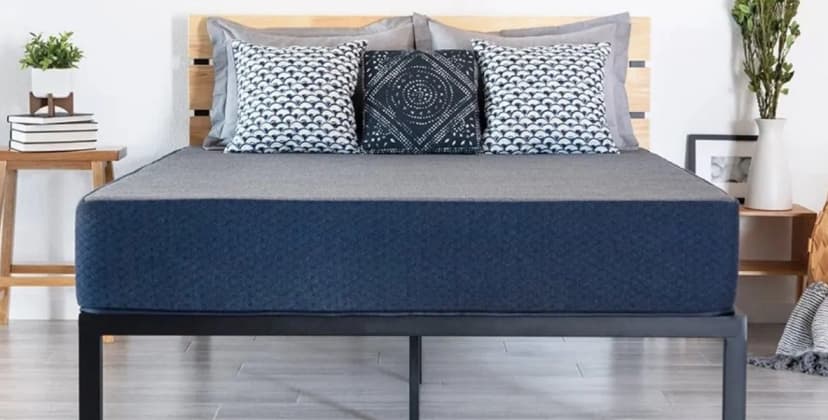
Mattress Type
Foam
Firmness Options
Medium Soft (4), Medium (5), Medium Firm (6), Firm (7), Firm (8)
Trial Period
120 nights (30-night requirement)
Full Details
Who It’s Best For
Both adults and kids can enjoy the Dreamfoam Essential. Adult side sleepers who use a bunk bed may prefer the added cushioning of the 10-inch model, while kids and adult back or side sleepers should be comfortable on the 6-inch or 8-inch models.
Feel
Firmness levels for the Dreamfoam Essential range from medium soft (4) in the thickest model to firm (8) in the thinnest model. The thinner models are firmer due to their thinner comfort systems.
What It’s Made Of
The basic design of the Dreamfoam Essential incorporates a layer of gel-infused memory foam over a high-density polyfoam base. These layers vary in thickness depending on the model. The 12-inch and 14-inch models have an additional layer of transitional polyfoam.
What We Don’t Like
As it’s an all-foam bed, the Dreamfoam Essential may trap heat, especially in the models measuring 10 inches or thicker. Some sleepers also find it difficult to change positions on the memory foam. Brooklyn Bedding subtracts a $99 handling fee if you end up requesting a refund.
Scoring & Reviews
The following ratings show how suitable this mattress is for different sleeping positions and sleeper weights. These scores are determined by how well the mattress supports and relieves pressure for each sleeper type.
We performed a meta-analysis on 4107 validated customer reviews of the Dreamfoam Essential. This is what people who bought the mattress had to say:- Firmness Variety: Offers options ranging from very firm to less firm, catering to different comfort preferences.
- Easy Setup: Customers appreciate the ease of ordering, quick delivery, and simple setup process.
- Comfort Level: The mattresses are frequently described as comfortable, providing a good night’s sleep in various settings like RVs and home use.
- Size Options: Available in various sizes, including narrow and custom dimensions, making it suitable for unique spaces.
- Lightweight: Users noted the mattress is light and easy to move, beneficial for changing sheets or adjusting positions.
- Value: Many reviewers found the mattress to be reasonably priced for the quality and comfort it provides.
Best Organic
Avocado Eco Organic Kids Mattress
7.5 /10
Test Lab Score
Up to $500 off mattresses
Up to $500 off mattresses
Made with organic cotton, wool, and latex, this latex hybrid provides a safe, chemical-free surface for your child to sleep on. The Avocado Eco Organic Kids Mattress carries certifications from a host of eco-friendly organizations including the Global Organic Latex Standard (GOLS) and the Global Organic Textile Standard (GOTS). The bed is 7 inches thick, designed to fit bunk beds and trundle beds.
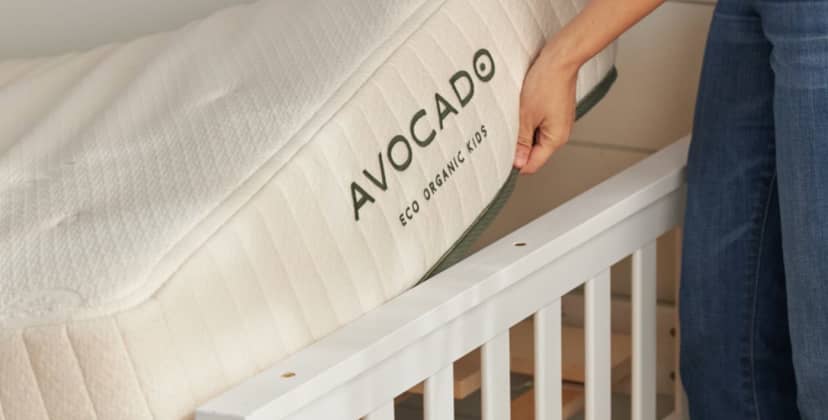
Price
$649
Mattress Type
Hybrid
Firmness Options
Firm (7)
Trial Period
100 nights
Full Details
Who It’s Best For
The Avocado Eco Organic Kids Mattress is ideal for young back and side sleepers. The breathable and responsive surface also works well for people who sleep hot, as well as combination sleepers or kids who prefer bouncy beds.
Feel
Dunlop latex provides resistance to prevent sleepers from sinking too far into the bed, while the coils below add pushback and a slight bounce. The Avocado Eco Organic Kids Mattress is rated as firm (7).
What It’s Made Of
The Avocado Eco Organic Kids Mattress has an organic cotton cover lined with a moisture-wicking organic wool fire barrier. The body of the bed contains 1 inch of Dunlop latex and a 6-inch pocketed coil core that’s made with recycled steel and encased in food-grade fabric.
What We Don’t Like
This mattress doesn’t offer the plush pressure relief of a memory foam model. Shipping timesfor this mattress take a little longer than usual, so expect to wait a few weeks. Avocado charges a $99 fee for returns.
Scoring & Reviews
The following ratings show how suitable this mattress is for different sleeping positions and sleeper weights. These scores are determined by how well the mattress supports and relieves pressure for each sleeper type.
We performed a meta-analysis on 76 validated customer reviews of the Avocado Eco Organic Kids Mattress. This is what people who bought the mattress had to say:- Organic and Chemical-Free: Many reviewers appreciate that the mattress is made from organic materials and is free from toxic chemicals, providing a healthier sleep environment for children.
- Suitable for Sensitive Users: Parents have reported improvements in their children’s sleep quality, including reduced congestion, attributing this to the chemical-free nature of the mattress.
- High-Quality Materials: The craftsmanship and quality of materials used in the mattress receive high praise, with customers noting its durability and solid construction.
- Responsive Customer Service: Positive experiences with customer service are commonly reported, with mentions of prompt and helpful responses.
- Ideal for Various Bed Types: The mattress fits well in different bed setups including bunk beds, trundle beds, and Montessori floor beds, making it versatile for various children’s bedroom designs.
- Heavy and Difficult to Move: A few reviews noted that the mattress is quite heavy, which can make it challenging to move or set up.
Best Pressure Relief
Brentwood Home Juniper
6.9 /10
Test Lab Score
Up to 15% off organic mattresses
Up to 15% off organic mattresses
Kids need a fairly firm mattress to support spinal development, but that doesn’t mean the mattress has to be uncomfortably hard. The Brentwood HomeJuniper combines pressure-relieving gel memory foam with a sturdy and supportive polyfoam base. It has a slim 6-inch profile designed to meet bunk bed height requirements.
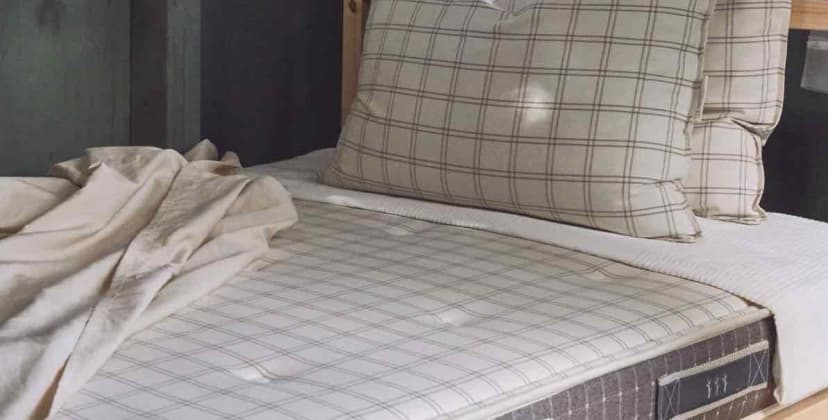
Mattress Type
Foam
Firmness Options
Medium Firm (6)
Trial Period
365 nights (30-night requirement)
Full Details
Who It’s Best For
The Juniper caters to young sleepers who like a bit more pressure relief. We would recommend it for children who sleep primarily on their side or back.
Feel
Memory foam cradles the sleeper to relieve pressure points, while the polyfoam base works to prevent excessive sinkage. Overall, this bed has a medium firm (6) feel.
What It’s Made Of
The Juniper has a straightforward design consisting of 1 inch of gel memory foam over a 5-inch polyfoam base. Both foam layers contain a portion of plant-based materials, and the mattress is wrapped in a GOTS-certified organic cotton cover.
What We Don’t Like
Due to its all-foam design, the Juniper may sleep hot. Some customers have trouble getting rid of the initial off-gassing odor.
Scoring Breakdown
The following ratings show how suitable this mattress is for different sleeping positions and sleeper weights. These scores are determined by how well the mattress supports and relieves pressure for each sleeper type.
Presidents’ Day Mattress Sales Are Here!
Presidents’ Day is a great time to buy a new mattress, with many top brands offering major discounts for shoppers. Visit our full list of Presidents’ Day mattress sales to learn about the best deals.
The Best Deals of The Week
-
Save $166
—
Brooklyn Bedding CopperFlex Memory Foam
$499 (List Price $665) -
Save $593
—
Helix Midnight Luxe
$1,780 (List Price $2,373) -
Save $2,518
—
Nectar Adjustable Bundle
$1,398 (List Price $3,916) -
Save $300
—
WinkBed
$1,499 (List Price $1,799) -
Save $999
—
DreamCloud Mattress
$665 (List Price $1,664)
Best Mattress Overall
Helix Kids
8.5 /10
Test Lab Score
27% off sitewide + 2 free Dream Pillows with a mattress purchase. Code: SF27
Shop NowA two-sided mattress that your child can use in their bunk throughout childhood.
See More Details
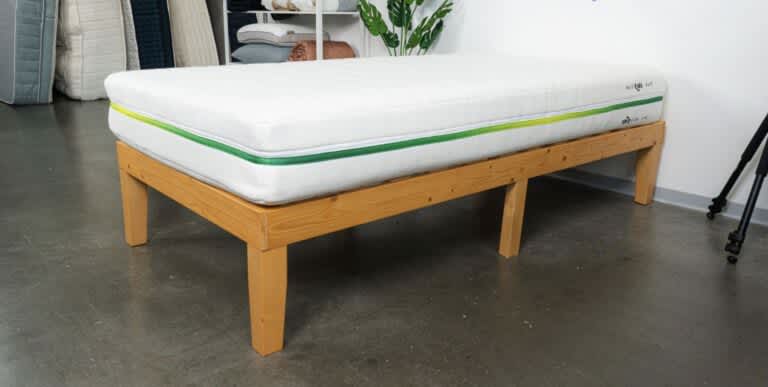
Credit: Sleep Foundation Test Lab
Best Value
Dreamfoam Hybrid
7.5 /10
Test Lab Score
25% off sitewide. Code: PRESDAY25
Shop NowA feature-packed, competitively priced hybrid for bunk bed sleepers.
See More Details
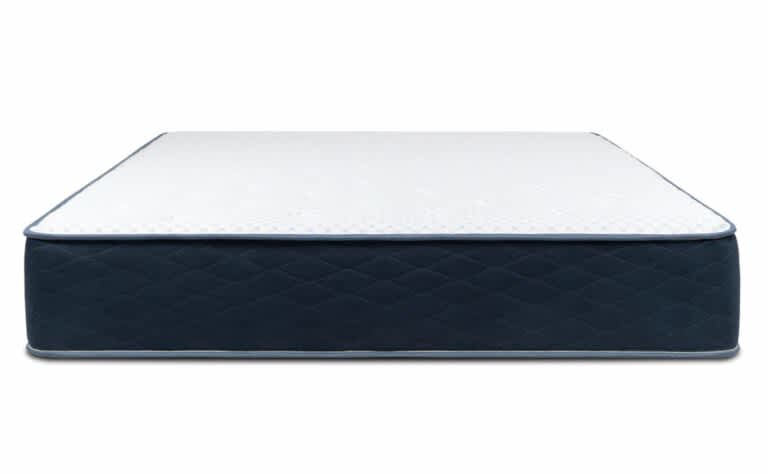
Best Luxury
Saatva Youth
8.3 /10
Test Lab Score
Up to $600 off
Shop NowA dual-sided mattress with a sophisticated design for child and teen bunk sleepers.
See More Details
Most Comfortable
Bear Cub
7.8 /10
Test Lab Score
35% off + free pillows with code: SF35
Shop NowA well-balanced hybrid with a slim design perfect for your bunk bed.
See More Details
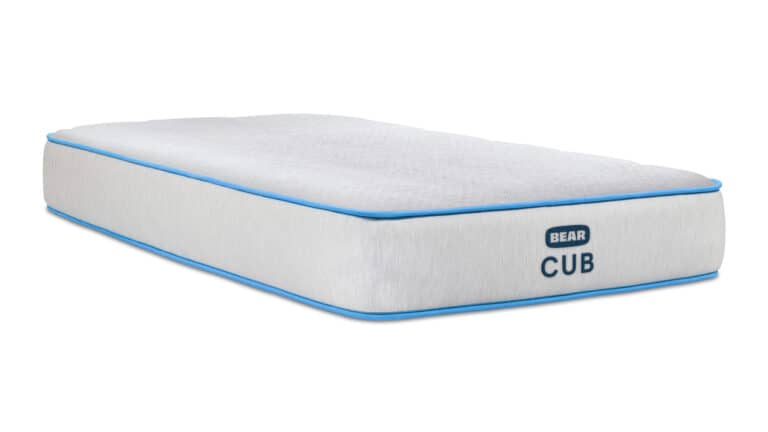
Best for Younger Kids
Nest Bedding Puffin
7.7 /10
Test Lab Score
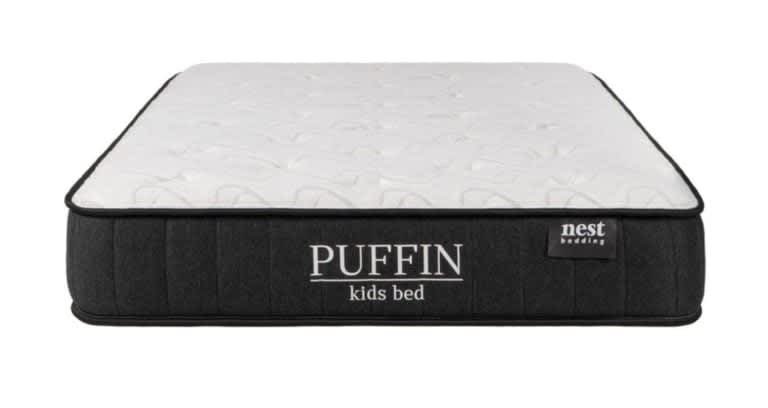
Best Low Profile
Dreamfoam Essential
7.2 /10
Test Lab Score
25% off sitewide. Code: PRESDAY25
Shop NowMultiple profile and firmness options accommodate bunk sleepers of all shapes and sizes.
See More Details
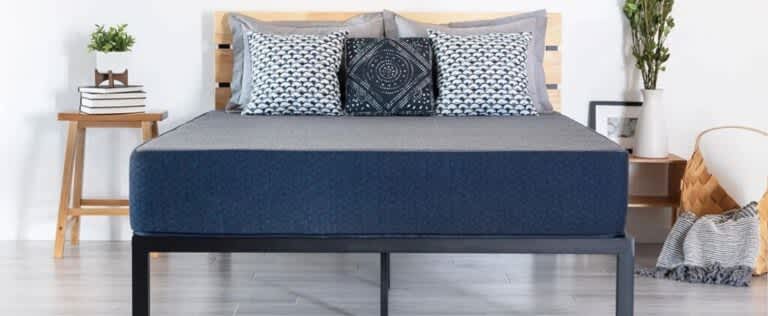
Best Organic
Avocado Eco Organic Kids Mattress
7.5 /10
Test Lab Score
Up to $500 off mattresses
Shop NowA mattress made with sustainable and durable materials to complete your child’s bunk bed setup.
See More Details
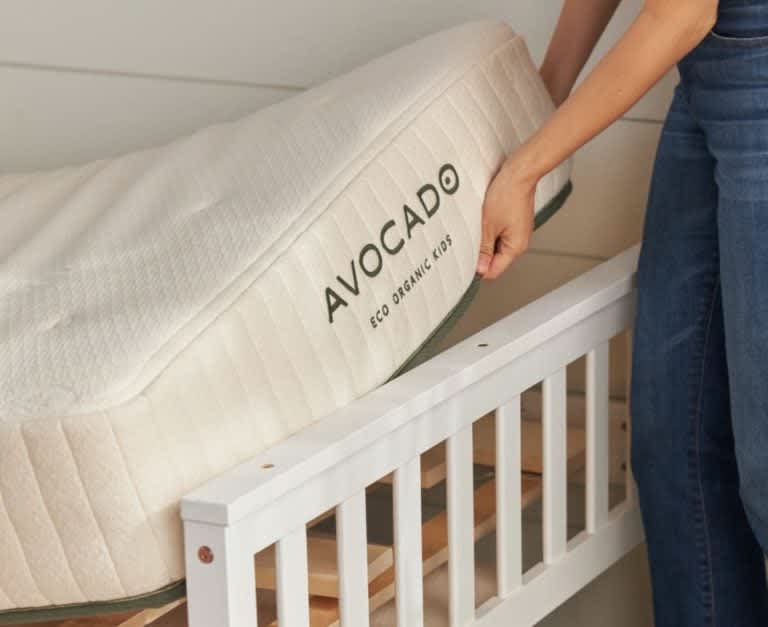
Best Pressure Relief
Brentwood Home Juniper
6.9 /10
Test Lab Score
Up to 15% off organic mattresses
Shop NowGel memory foam works to prevent pressure point formation in this bunk-friendly mattress.
See More Details

How to Choose the Best Bunk Bed Mattress
In order to find the best mattress for a bunk bed, you’ll need to take a few factors into account. The mattress should meet certain size, weight, and thickness requirements for the bed, especially if you plan to use it on a top bunk. Other variables include price, durability, firmness level, and the age, body type, and sleep position of the sleeper who will primarily use the mattress.
Read on to learn more about choosing the best bunk bed mattress. We’ll also cover bunk bed styles and safety concerns for these bed models.
What to Look for in a Bunk Bed Mattress
During your search for the right bunk bed mattress, you’ll likely come across a wide variety of beds advertised with misleading terms and descriptions. Some mattress companies tout their models for “universal comfort” regardless of the sleeper’s body type and sleep position, or make the claim that their beds will last for at least 10 years. As you browse different brands and models, keep in mind that each mattress is designed to feel more comfortable for certain types of sleepers, and less so for others. We encourage you to focus on the nuts and bolts of the mattress and consider the following factors instead.
- Size: The vast majority of bunk beds sold today are compatible with twin, twin XL, and/or full mattress sizes. All three of these sizes are best suited to one person and will probably be too narrow for two or more sleepers. Make sure to check the specs on your bunk bed to see the proper size for each individual bunk.
- Profile: Low-profile mattresses of 6 to 7 inches thick are typically best for bunk beds. This ensures the mattress is thick enough to support the sleeper, but not too tall for the bunk and its safety rails. According to the U.S. Consumer Product Safety Commission, the mattress should be at least 5 inches shorter than the top of the rails. (Scroll down for a detailed list of bunk bed safety tips.)
- Weight: Bunk beds always have a listed weight capacity that includes all mattresses and sleepers. For this reason, lighter mattresses tend to be best for bunk beds. Excessively heavy mattresses pose serious safety concerns for sleepers on lower bunks. Before selecting a mattress, add up the total weight for all sleepers who will use the bed and subtract this number from the bed’s listed weight capacity.
- Contouring: Mattresses that contour evenly and consistently can distribute your weight and reduce pressure points throughout the body. Poor spinal alignment is a common issue for side sleepers, so they typically need closer contouring to ensure the shoulders, lower back, and hips are evenly supported.
- Noise: When picking out mattresses for a bunk bed, you should consider all-foam or all-latex models that do not make any noise. This can reduce nighttime disruptions for everyone sharing the bunk bed. Hybrids and innersprings tend to produce more squeaks and creaks due to their coil systems.
- Price: The cost of a new mattress largely depends on the bed’s material composition. All-foam and innerspring mattresses are the cheapest options, with an average queen size price-point of $900 to $1,200. All-latex and hybrid models cost a bit more – about $1,600 to $2,200 for a queen mattress, on average.
- Temperature Regulation: Mattresses with breathable components tend to sleep noticeably cooler than other models. These components may include ventilated latex or foam comfort layers, coil systems that promote steady air circulation, and covers made from breathable fabrics and fibers. All-foam mattresses generally absorb and trap the most body heat.
- Durability: The average mattress will perform for six to eight years before a replacement is needed. Excessive sagging and loss of support are the most common reasons for retiring a mattress. All-latex mattresses tend to last longer because latex is a naturally durable material that won’t sag or deteriorate as quickly as memory foam or polyfoam.
- Firmness Level: Mattress firmness is assigned using a 1-10 scale, with 1 being the softest and 10 the firmest. Most mattresses sold today fall between 3 and 8. A softer mattress conforms more closely for side sleepers and those weighing less than 130 pounds, but it will probably sink too much for people who weigh more than 230 pounds – especially back and stomach sleepers. These individuals should consider a firmer mattress with stronger support instead.
- Pressure Relief: For any given sleeper, the best mattress for pressure relief will conform to the body and support the spine without sagging too much beneath the sleeper’s heaviest areas. Therefore, a mattress that alleviates pressure very well for one sleeper may not provide enough relief for another person with a different body type or way of sleeping.
What Types of Bunk Beds Are Available?
If you’re in the market for a new bunk bed, you’ll be able to choose from a wide range of styles. The most common bunk bed designs include the following:
- Standard: A standard bunk bed is constructed with two stacked bunks of the same size. Most standard models are designed for two twin bunk bed mattress models, but you may also find some that are compatible with twin XL or full sizes instead. The top bunk is detachable, allowing you to separate the beds. This makes standard bunks ideal for two siblings who will eventually sleep in separate rooms.
- Triple: Triple bunk beds are built with three separate bunks of a matching size – twin, in most cases. The bunks may be stacked three-high. Another common design is two adjoining bunks on the bottom in a straight line or an L-shape, with the third bunk stacked over the middle where both bottom bunks intersect. Like standard bunk beds, most triple bunk beds can be detached to create three individual beds.
- Standard Loft: In a standard loft bunk bed, the sleep surface is stacked over an open space that measures at least three to four feet high. This space may contain a workstation with a desk and computer – a popular layout for college dorms and teenager bedrooms. Most standard lofts are also tall enough for a sofa or chair to fit underneath.
- Triple Loft: Triple loft bunk beds feature two top bunks that connect at a 90-degree angle. As is the case with a standard loft, you’ll find an open space of at least three to four feet high beneath one of the bunks. The other bunk is stacked over a third bed. Due to their larger specs, these bunk beds are normally positioned in one corner of a room to maximize floor space.
- L-Shaped Bunk: An L-shaped bunk bed features two individual bunks. Rather than being evenly stacked, the bunks are stacked in perpendicular fashion. A ladder next to the lower bunk allows sleepers to access the top bunk. Many L-shaped bunks also offer drawers or compartments for added storage.
- Twin-Over-Full: As the name suggests, a twin-over-full bunk bed is constructed with a twin size top bunk and a full size bottom bunk. These beds are a good option if you have three children sharing the bed but their room is not tall enough to accommodate a triple bunk.
- Trundle: A trundle bunk bed accommodates three individual sleepers. Two use the evenly stacked bunks, while a third bed can be accessed using a pull-out drawer attached to the bottom bunk. When not in use, the third bed can be pushed back in to free up more floor space.
- Futon: A futon bunk bed has a top bunk similar to that of a standard or triple bunk. The bottom contains a futon-style sofa that can be folded down to create a bed surface. Futon bunk beds are another popular choice for dorm rooms.
What Types of Mattresses Are Best for Bunk Beds?
Material composition is an important mattress consideration because each mattress type carries certain pros and cons based on its components. For bunk beds, all-foam models tend to work best. These mattresses are relatively light, so you won’t need to worry about exceeding the bunk bed’s weight capacity. They are also completely silent, allowing sleepers to get onto their bunk without disturbing their bunkmates.
Most mattresses sold today fall into one of five general categories based on their materials, but only a few of them are best for use in a bunk bed. Each category is fairly consistent across different models in terms of price, durability, and performance, but you’ll also find plenty of variation between models of the same type.
Foam
Definition: An all-foam mattress is constructed with comfort and transitional layers of memory foam or polyfoam. If a mattress contains both types of foam, it is considered a “mixed-foam” model. The support core is always made of high-density polyfoam. The average all-foam mattress costs between $900 and $1,200 in a queen size.
Exceptional Pressure Relief: Most all-foam mattresses offer noticeable body-conforming and even weight distribution. For side sleepers, softer all-foam models cushion the shoulders and hips to help align the spine and alleviate pressure. Firmer foam mattresses tend to alleviate more pressure for back and stomach sleepers by promoting even support with minimal sagging.
Hybrid
Definition: A hybrid is a specific type of coil mattress that offers more cushioning and closer body-conforming than a traditional innerspring. The comfort layers are often made from contouring materials like memory foam, latex, and microcoils, while the support core almost always contains pocketed coils and some type of base polyfoam. The average hybrid costs between $1,600 and $2,200 in a queen size.
Balanced Comfort and Support: Hybrids are a comfortable compromise for many sleepers. Their adaptive comfort layers offer a deeper contour, resulting in better pressure relief and motion isolation than you normally receive from a coil mattress. However, the coils offer sturdy edge support and better temperature control than the solid base layers found in all-foam and all-latex models.
Innerspring
Definition: An innerspring is usually constructed with one or two thin comfort layers of polyfoam, along with a support core of steel coils. Innersprings are the most popular type of mattress sold today. This category is also the cheapest, with the average queen size model priced between $900 and $1,100.
Excellent Responsiveness: Innersprings are highly responsive, creating a noticeable bounce on the surface than many people enjoy for sleeping (as well as sex). Most people have an easier time moving across these mattresses compared to those that respond more slowly and sink deeply. Edge support for innersprings is above average, as well.
Latex
Definition: Latex is a foamy material processed from the sappy extract of rubber trees. Latex is naturally responsive and feels bouncier than polyfoam or memory foam, but it also offers body-contouring and pressure relief without a deep sink. Latex is very durable, as well. The average latex mattress costs between $1,600 and $2,200 in a queen size.
Temperature Control: Latex does not absorb and trap heat like foam, so all-latex mattresses tend to sleep quite cool. Many of these models have ventilated layers for added airflow, and their covers are often made of breathable fabrics like organic cotton and rayon from bamboo.
Last Things to Consider with a Bunk Bed Mattress
Now that we’ve discussed bunk bed styles and the best types of mattresses for these beds, let’s conclude this guide with some final considerations for first-time bunk bed shoppers.
Bunk Bed Safety
Bunk beds are subject to federal laws outlined in the Consumer Product Safety Improvement Act of 2008 and other pieces of legislation. According to the U.S. Consumer Product Safety Commission (CPSC), federal bunk bed requirements include the following:
- Each upper bunk must have a guardrail on each side. Lower bunks do not require guardrails if they are 30 or fewer inches off of the ground.
- The guardrail must run the entire length of the side next to the wall. An exception is made for gaps of .22 inches or less between the guardrail and the nearest end.
- On the side away from the wall, gaps between the guardrail and the end of the bed cannot exceed 15 inches.
- The top of the guardrail must exceed the mattress profile by at least 5 inches on all sides.
The CPSC also lists requirements for bunk bed ends, entrapment prevention, and materials used to construct the bed. We encourage you to read all CPSC bunk bed requirements, and please make sure the bunk bed you buy meets all of the federally mandated criteria.
Long-Term Use
Mattress durability should be a major consideration, but you may not need a mattress with an exceptionally long lifespan for your bunk bed. Children often outgrow their mattresses during their pre-teen and teenage years. By the time they hit junior high or high school, they may be too tall for a twin or full size bunk bed mattress. In these cases, buying a cheaper mattress with a shorter lifespan for the bunk bed may be more cost-effective than paying top dollar for a very durable model.
Many siblings also stop sharing bedrooms when they reach these ages. Most bunks can be disassembled into single beds, allowing your child to keep using the same mattress after they no longer sleep in the bunk. If your child does not undergo any major growth spurts, they may be able to use the same mattress for the remainder of their childhood.
Body Weight
As we mentioned earlier, the listed weight capacity of a bunk bed refers to the sleepers and their mattresses. If your two children weigh 50 to 60 pounds and share a bunk bed with a 200-pound weight capacity, this means their mattresses should weigh no more than 40 to 50 pounds each. If the same children share a bunk bed with a weight capacity of 400 to 500 pounds, you’ll have more wiggle room for selecting a mattress based on weight.
Most bunk beds have weight capacities of 200 to 500 pounds. Always check this figure before buying mattresses for your bunk and never exceed the weight capacity under any circumstances.
How We Test: Your Comfort Is Our Science
Our industry-leading product testing team cares deeply about improving your sleep. Having a holistic understanding of a mattress’s role as part of a sleep system is paramount to our testing process. Since a bed’s comfort and feel depend largely on body weight and sleeping position, our testing team represents a wide range of body types, sleep positions, and comfort preferences.
In our Seattle-based Test Lab, we use an objective, hands-on process to evaluate mattresses across performance categories. The following are the key guidelines that inform our performance ratings. Our ultimate goal is to ensure you have all the information you need to make the best purchase decision for you.
Construction analysis: Mattress construction plays a major role in our ratings system. We begin our testing with a top-to-bottom analysis of each mattress, making note of its materials, firmness, thickness, and other physical attributes. Price-point is another major factor as we assess quality of materials and overall value.
Quantitative product testing: For hands-on testing, our team members take turns lying and moving on each mattress. This immersive process helps us evaluate beds for performance categories like motion isolation, pressure relief, ease of movement, and temperature control.
Field testing: Once we’re finished testing a mattress in our lab, one of our team members takes it home and sleeps on it in their own bedroom for two to three weeks. Field testing helps us understand how each mattress performs in the long term.
User feedback: In addition to our team’s testing data, we draw from customer surveys and product reviews to calculate our final ratings. This helps us ensure our findings are consistent with real-world experiences.
How We Determine Our Overall Scores


To determine a mattress’s overall score, we assign weighted percentages to performance categories based on how important they are to the individual sleep experience. For instance, areas like pressure relief and temperature control tend to matter more to people than something like off-gassing, and because more people sleep on their side and back than on their stomach, we weigh those positions more heavily
Performance Categories
Motion Isolation
This criteria alludes to the amount of motion a mattress absorbs when a sleeper moves on the surface. We use two testers lying side by side to evaluate motion isolation, who each feel for transfer while the other person moves on the mattress.
Temperature Control
To determine how well a mattress regulates temperature, we perform temperature tests and look closely at its materials and construction. Many mattresses are designed with cooling components meant to reduce heat retention.
Pressure Relief
A bed with strong pressure relief excels at preventing pressure from building up in areas like the shoulders and hips. Beds with even contouring and weight distribution are top performers when it comes to pressure relief.
Off-Gassing
A mattress in a box may release unpleasant chemical odors for a short period after you’ve unboxed it. The initial smell may be strong but typically fades within 2 or 3 days.
Ease of Movement
This criteria reflects how easily a sleeper can move across a bed’s surface. Responsive surfaces made of latex typically perform better than foam surfaces, which can inhibit movement.
Edge Support
We perform sit tests along a bed’s perimeter to measure how well the edges push back against weight. Mattresses with strong edge support have minimal sagging when sleepers sit on or lie close to the perimeter.
Dive Deeper – Mattress Guides by Type
If you’d like to refine your search for your children’s beds beyond bunk bed mattresses, take a look at our other recommendations broken down by mattress type.
Best Mattress by Type
- Best Mattress in a Box
- Best RV Mattress
- Best Mattress in Canada
- Best Smart Mattress
- Best Online Mattress
- Best Flippable Mattress
- Best Airbed Mattress
- Best Mattress for Bunk Beds
- Best Mattress on Amazon
- Best Temporary Air Mattress
- Best Walmart Mattress
- Best Pillow Top Mattress
- Best Crib Mattress
- Best Gel Mattress

Still have questions?
Our product experts have extensive experience testing just about every sleep product on the market.
Send an email to [email protected] with your questions and we’ll help you find exactly what you’re looking for.

